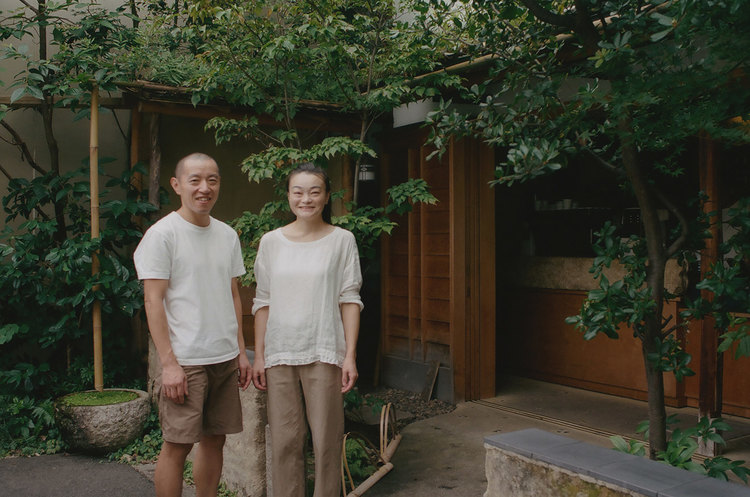
Interview with WEEKENDERS COFFEE: I want to be like a perch for others
When contemplating a souvenir from a visit to Kyoto, the traveler might instinctively procure some matcha-flavored cakes, considering the drink’s ubiquity in the city. But this traveler would be surprised to know that locals drink more coffee here than any other city in Japan. In addition to the classic Showa-era kissas (cafes), there are new coffee stands popping up everywhere and it’s not a long search to find locally roasted coffee. In Kyoto, the first name in delicious locally-roasted beans is WEEKENDERS COFFEE, located on Tominokoji Street. When Owariya’s cake shop opened in 2020, we collaborated with WEEKENDERS and it was such a delicious union, we’re doing it again, releasing a “Soba Mochi and Coffee” takeaway set. We interviewed Masahiro Kaneko, the representative of WEEKENDERS COFFEE.
Walking north on Tominokoji from Nishiki Market (known as Kyoto’s “Kitchen”), you’ll see a coin-parking lot on your left, where nearly inconspicuously set behind cars and vans is WEEKENDERS COFFEE. It’s a small, beautifully restored machiya (traditional townhouse) building with a bench facing a small, lovely Japanese garden.


How did you choose this place?
Kaneko-san says, “When I visited Melbourne I was intrigued by their coffee culture. In the city’s business district, many people go to a cafe around 7am finishing their coffee before going to work. Inside the stores are standing tables and counters and outside folks are sitting on milk cases drinking with other customers and chatting up baristas. It’s a very casual atmosphere, different from Japan, where customers often just converse with themselves rather than baristas or meeting other folks. I’m interested in a space where baristas and customers can connect, and to increase communication between individuals. One morning while jogging through Downtown I found this space. I like how big the sky looks here even though we’re in the center of Kyoto City.”
Is your shop like the one you saw in Melbourne?
“Yes, it is. We opened a few years before the pandemic. We used to get tourists coming in at 7:30 in the morning before going out sightseeing. We’d talk about where they’re visiting that day. We’d advise what else they might see or visit in a given area, and often the following morning they would return to tell us what they saw and did. It was a nice feeling. I like the idea of our cafe becoming a place like a “perch” for visitors where they can pause, gather, and reset.”

How has the pandemic affected your business?
“No doubt more people these days are drinking coffee at home, meaning more folks working from home are buying beans and brewing them at home. We’re often trying to figure out what these buyers might want to know and so we’re researching the drip packs that can be brewed more deliciously. On our website we post: “How to deliciously brew”

We’re rereleasing the “soba mochi and coffee” set this autumn. Why do they taste so good together?
“It’s the impact of combining soba mochi and Colombian coffee, which has a delicious, unanticipated flavor. It’s the combination of the two together enhancing each other’s taste.”

Is it delicious even if you add milk?
“I feel that soba mochi goes well with milky coffee, but it’s important how you handle the steps: If you add a little milk to the black coffee, it might get watery, so it’s better to reverse the process. First the milk, then the coffee poured over.”


What are your goals for the future?
“I really enjoy focusing on what I can do now rather than setting long- or short-term goals. What I’m doing now is connecting with producers, producers living at high altitudes where there is no easy access/transportation. We see their living and working conditions. Because we continue procuring their beans, we help their local economy (like perhaps with road-building and building better transportation networks). This could lead to a positive change in their lives. That’s what I hope for the future.”

A cup of coffee, so simple, but so complex. To know the provider and to connect with them gives me a sense of security and joy similar to the soba noodles at Owariya. It is simple, but not easy to think of people who are on the other side of the earth, and to wish them well and to contribute.
We’re very grateful for everyone in the chain, from farmers to roasters, that provide us with the opportunity to drink a delicious coffee.
Why not open a drip pack and slowly pour yourself a hot one while imagining the miracle of that journey from the bean to the cup. Just don’t forget to put the milk in first.
